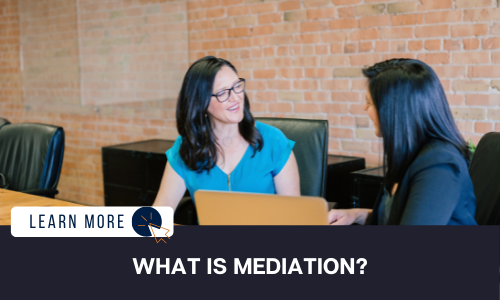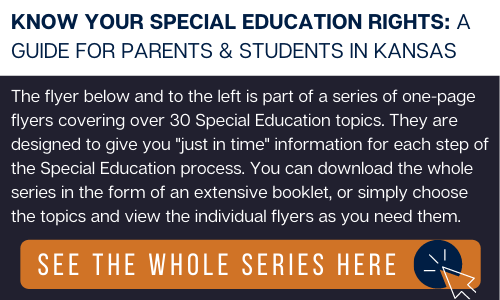What is Mediation?
 |
 |
PDF Version: What is Mediation?
PDF Version: Full Guide of all 30+ Flyers (Compiled as a Booklet)
Versión en Español en Formato PDF: ¿Qué es la Mediación?
Mediation brings in a third party to guide you and the school during a disagreement regarding your child’s special education services. The mediator is neutral. They are trained to help you and the school come to an agreement. The State of Kansas pays for this service. You do not have to pay.
The parent(s) and the school have the choice to participate or not. Mediation only happens if both sides agree to do it.
When should I request mediation?
You should first try to solve the disagree with the school or district. Then, you may request mediation if you do not agree with what the school is or is not providing for your child. This could be related to your child’s IEP, evaluation, placement, or another special education issue.
Mediation should be convenient. It should be provided in a timely manner. It also must take place somewhere that works for you and the school.
How does mediation end?
If an agreement is reached, the mediator will put the agreement in writing and everyone will sign it. If an agreement is not reached, the mediation ends. The mediator will declare that the two sides could not agree. Anything said in a mediation is confidential. It cannot be used as evidence in a due process hearing.
Should I request mediation or a due process hearing?
It is generally good to request mediation first. Then, you may not need to request a hearing. This can be helpful because it will take less time and less money. It is also friendlier. Both sides can offer solutions and decide on an agreement. In a hearing, it is the hearing officer that makes the decision. You may not like the decision of the hearing officer. Mediation can also strengthen the relationship between you and the school. However, mediation can also take place while you wait for a due process hearing.
How do I request mediation?
You should first ask the school if they will participate in mediation. Then, you can fill out a form to request it. This is a form from the Kansas State Department of Education. You can ask the school for this form. You can also find it here.
Sources & Additional Resources
Kansas Special Education Process Handbook, Chapter 10. Kansas State Department of Education.
Dispute Resolution. Kansas State Department of Education.
Disclaimer: This fact sheet is not intended to provide specific legal advice. If you need legal advice, please contact an attorney. Only an attorney can give you specific legal advice based on your particular situation. We try to update our materials regularly, but the law can change frequently. This publication is based on the law at the time that it was written. Future changes in the law could make information in this fact sheet inaccurate.
.png)





